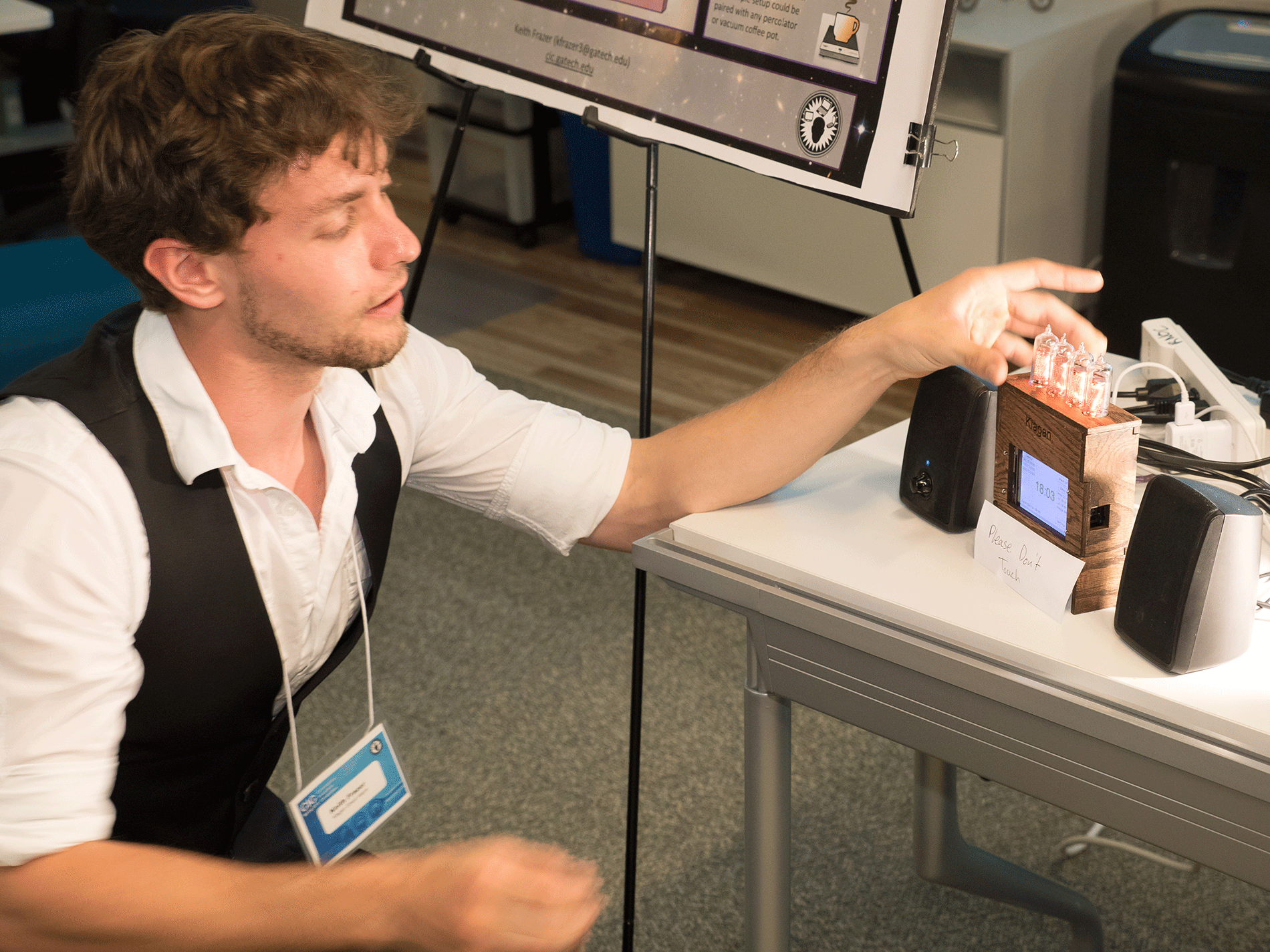
As we celebrate the holiday season, the end of this year and the anticipation of a new year ahead, I would like to take this opportunity to reflect on IPaT’s many successes in 2015 and the talented people who made it possible.
Dear IPaT Community,
As we celebrate the holiday season, the end of this year and the anticipation of a new year ahead, I would like to take this opportunity to reflect on IPaT’s many successes in 2015 and the talented people who made it possible.
We’re pleased to partner with Children’s Healthcare of Atlanta, Emory University, and Morehouse School of Medicine to award funds that are designed to stimulate new research projects and build new collaborations in research areas related to children’s health. In February, the Pediatric Research Pilot Grants funded more than two dozen projects. IPaT’s May Wang and Nicoleta Serban were among 18 Georgia Tech grant recipients for their work for the Center for Transforming Pediatric Healthcare Delivery (CTPHD).
IPaT returned to the annual HIMSS conference in 2015. Both IPaT and I3L had booths at the Chicago conference, where we discussed our healthcare initiatives. In attendance were: Margarita Gonzalez, Caroline Wood, Sherry Farrugia, Leanne West, Laura Burkhart, Margaret Dahl, Marla Gorges, and Rahul Basole. Steve Rushing led an educational session about I3L’s Mohawk Industries project, while Mark Braunstein discussed our unique synthetic FHIR-based HER for teaching and research. May Wang also held a talk on “Sensors and Informatics, Personalized Health Anytime Anywhere.” HIMSS brings together more than 38,000 healthcare IT professionals, clinicians, executives and vendors from around the world.
Georgia Tech student innovation was on display in April at the annual Convergence Innovation Competition. Forty teams of over 150 students submitted projects in the categories of Intelligent & Automated Home, Connected Vehicle, and Smart & Sustainable Communities. Students presented their projects to a select group of industry, partner, and faculty experts at a live demonstration and judging event at IPaT. The CIC is open to Georgia Tech students from every class and discipline.
A May symposium celebrated community innovation and provided an inside look at the planned high performance computing center in Tech Square. The center, scheduled to open in 2018, will be located between Spring Street and West Peachtree Street behind Georgia Tech’s Scheller College of Business. The Institute will serve as an anchor tenant, using the space for research programs in computing and advanced big data analytics. The remaining space will be available for corporate entities and partners. The symposium also featured a look back at the history of Georgia Tech’s community innovation ecosystem, including what it means for the campus to be a living laboratory.
For a fifth year, IPaT hosted its annual Faculty Retreat with over 100 faculty in attendance. For this year’s retreat, we wanted to focus on listening to faculty in terms of the grand challenges driving their research and pull together faculty from across campus with synergistic research interests. The retreat included breakout groups on Real-Time Disaster Response, Smart Cities and Wise Communities, Wearable / Instinctual Computing, Pediatric Healthcare Delivery, and Learning Healthcare Systems. Everyone was urged to go for audacious breadth when discussing research perspectives and goals. Presentations sparked great discussions with the audience, including Georgia Tech Executive Vice President for Research Steve Cross.
This year’s Wearable Computing Center Forum was a huge success, with 200 registered attendees. The forum featured an expert panel on wearable technology, a show and tell of wearable computing gadgets, and a keynote on wearable technology in the workplace. The event wrapped up with a reception and special musical performance by Italian artist Rhó, who performed with a wearable tech musical garment designed and built by Georgia Tech researchers.
In October, Georgia Tech and Georgia State University partnered with the City of Atlanta as founding members in the MetroLab Network. MetroLab is part of the Obama Administration’s “Smart Cities” initiative to help communities tackle local challenges and improve city services. Supported by a $1 million grant from the John D. and Catherine T. MacArthur Foundation, the network seeks to research, develop and deploy technologies to address challenges in the nation’s urban areas such as reducing traffic congestion, fighting crime, fostering economic growth, and managing the effects of a changing climate.
Also of note this year, the GVU Center and IPaT engagement grants. Each year, GVU and IPaT partner together to fund research initiatives committed to building on our success in interdisciplinary research and innovation in the human experience of computing. This year’s grant projects range from promoting cognitive systems research at Georgia Tech, to studying how researchers can use visualization techniques to explore “messy” humanistic data such as civic and cultural data.
And on the topic of Georgia Tech research, IPaT has compiled a snapshot of our thought leadership in healthcare, media, education, humanitarian systems, and enterprise transformation. The IPaT Research Digest is a bi-annual collection of summaries from a selected set of faculty publications. Projects featured in the digest represent a wide range of topics from more than 50 Georgia Tech researchers. The digest will be produced bi-annually and available in print and online.
Thank you to our colleagues and partners for contributing to our success in 2015. We look forward to working with you in 2016 and beyond.
Happy Holidays from IPaT!
Beth Mynatt, Executive Director, Institute for People and Technology at Georgia Tech